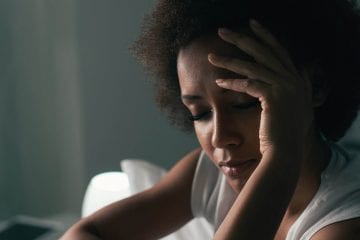Sleep disorders may not affect many healthy people, but do affect up to 50% of cancer patients; the most sleep disorders in the latter group are insomnia and irregular cycle of sleeping and waking.
The reasons for sleep disorders in cancer patients are various and can include:
- Physical changes brought about by cancer or resulting surgery
- Side effects of drugs or other treatments
- The hospital environment
- Worrying about the condition
- Other health issues.
Table of Contents
Tumors and sleep disorders
Tumors can cause sleeping disorders for the following reasons:
- Pressure on other parts of the body surrounding the tumor
- Tumors can cause gastrointestinal problems such as nausea, constipation, or diarrhea, each making it difficult to sleep.
- Irritation of the bladder or being unable to control the flow of urine
- Being woken up by pain
- Restlessness due to fever
- Coughing fits
- Trouble with breathing
- Itching and irritation
- Extreme tiredness.
Drugs or treatments can affect sleeping patterns
Cancer treatments and drugs can have adverse effects on sleep patterns and the quality of patients' sleep can be influenced by the following:
- Hormonal therapy treatment
- Taking corticosteroids
- Courses of sedatives and tranquilizers
- Antidepressant drugs and medications
- Anticonvulsant drugs and medications.
Using certain drugs for long periods may contribute to insomnia, as can ceasing or decreasing the use of certain drugs. Common side effects of drugs and treatments affecting the sleep-wake cycle of cancer patients include:
- Anxiety
- Pain
- Hot flushes
- Sweating
- Nausea
- Constipation
- Diarrhea
- Bowel problems
- Bladder irritation
- Uncontrolled urination
- Trouble breathing.
The hospital environment can contribute to sleep problems
Having a good night's sleep in hospital is more difficult because of:
- Physical factors such as unfamiliar or uncomfortable bed, sheets, pillows, etc.
- Noise
- Temperature
- Sharing a room
- Nursing and doctors’ rounds
- Ongoing treatment and examinations.
And, of course, there is the anxiety of actually being in hospital. This can be exacerbated by a patient's age.
Stress of cancer diagnosis can lead to sleeping problems
Anxiety and depression are common reactions to being diagnosed with cancer. Stress levels are increased by cancer treatment and being in hospital. These emotional strains are a common cause of insomnia in cancer patients.
There are a wide range of health problems not associated with cancer which also cause sleep disorders. So a cancer patient's sleep disorder may not be caused by the cancer, but by another health issue. Headaches, snoring, or daytime seizures can increase the likelihood of sleep disorders.
Assessing sleep disorders
Patients with sleep disorders will undergo a sleep assessment.
An assessment is completed to discover problems that might be causing the sleep disorder and what effect they are having on the patient's life.
Patients experiencing mild sleep disorders may be irritable and unable to concentrate, while people suffering from moderate sleep disorders can become depressed, anxious, and stressed.
Sleep disorders can make it harder to remain alert and engaged in daytime activities. This can involve patients forgetting instructions for their treatment and struggling to make decisions.
When patients have rested well, they have more energy which helps them cope with the negative side effects of the cancer and its treatment. Regular assessment is recommended as sleep disorders can escalate over time.
What does a sleep disorder assessment include?
Basically the assessment consists of three things: physical examination, health history, and sleep history assessments. The physical examination and health history are carried out by a doctor and include:
- Any side effects of the cancer and its treatment
- Medications used
- Any emotional effects of the cancer and its treatment
- Eating habits
- Exercise regimes
- What care is received.
Discussion with the patient and their family or carer about sleep patterns and history will also take place.
Polysomnogram to diagnose sleep disorders
Polysomnograms are recordings taken during sleep showing:
- Changes in brain wave patterns
- Rates of breathing
- Eye movements
- Blood pressure
- Heart rate and activity levels.
The information gained from these recordings assists doctors in finding the causes of sleeping disorders.
Treatment of sleep disorders
Treatment of sleep disorders often includes taking care of the side effects of cancer or its treatment.
Sleep disorders resulting from the side effects of cancer or its treatment may be aided by dealing with the symptoms of the side effects. It's important for sleep disorders to be discussed among patients, their family members, and the medical team so that everyone can learn and provide support. Supportive care can improve a patient’s quality of life and ability to sleep.
Reduced anxiety and increased relaxation through cognitive behavioral therapy (CBT)
CBT helps to reduce anxiety around getting the required amount of sleep. A patient can learn to replace negative thinking about sleep with positive images and thoughts to fall asleep more easily.
CBT will replace an anxiety causing thought such as “I cannot get to sleep” with a positive one such as “I am totally relaxed”. It teaches patients how to change poor sleeping habits that prevent them from having a good night's sleep.
Video CBT sessions with a professional practitioner have proven valuable when face-to-face sessions are not practical. A CBT session could include:
- Stimulus control
- Relaxation therapy
- Sleep restriction.
Let's look at each one in more detail.
Stimulus control
When people have been having prolonged sleep problems, the simple task of preparing for bedtime can become a worrying experience. The worry of not getting a good sleep becomes a catalyst for not getting a good sleep.
Stimulus control helps patients learn how to connect preparations for bedtime and being in bed only with sleeping. So the bedroom becomes the place where only sleep happens. By continually using the bedroom exclusively for sleeping the two become linked in the patient's mind.
The following habits can be altered by stimulus control:
Go to bed only when feeling ready to sleep.
Get out of bed if sleep does not come quickly.
Return to bed only when ready to sleep again.
Use the bedroom only for sleeping.
Sleep restriction
This involves restricting the time you spend sleeping. Of course, this will result in patients feeling more tired, which is the intended effect. The aim of sleep restriction is to make the following night a better opportunity for sleeping well. As patients' sleep improves, they can set more time aside for sleep.
Relaxation therapy
Relaxation therapy relieves muscular tension, reduces stress, lowers blood pressure, and helps control pain. It involves the tensing and relaxing of muscles throughout the body. It is often used in conjunction with guided imagery (focusing the patient's mind on positive images) and meditation (focusing thoughts).
Self-hypnosis when a patient is ready for sleep also helps to feel relaxed and induce sleep. Relaxation therapy makes it easier for stimulus control and sleep restriction to have a positive effect.
Adopting good sleeping habits
It is important for patients to adopt good sleeping habits. They will help them to more easily fall and stay asleep. Good recommended sleeping habits and routines include:
Comfortable sleeping environment
A comfortable bed and bedroom will help patients improve their sleep. The comfort of the bedroom can be improved with:
- Keeping noise levels low
- Keeping the lighting low
- Keeping the room temperature comfortable
- Keeping oneself clean and washing before bedtime
- Wearing loose and soft bed clothes or sleeping naked
- Clean bed linen
- Enough blankets to be warm
- Getting into a comfortable position by using pillows for support.
Regular bathroom habits
Having regular bowel and bladder movements will reduce the number of occurrences of a patient needing to use the bathroom during the night. Waking up during the night for trips to the bathroom can be cut back by patients adhering to:
- Drinking more fluids, particularly water, during the day
- Eating more foods high in fiber
- Not drinking before going to bed
- Using the bathroom before going to bed.
Diet and exercise
Adopting good dietary and exercise habits such as the following will promote better sleep:
- Being active during the day
- Regular exercise (not within 3 hours of sleep)
- Eating a snack high in protein 2 hours before going to bed
- Avoiding heavy, spicy, sugary foods before going to bed
- Avoiding alcohol before going to bed
- Avoiding smoking before going to bed
- Avoiding caffeine before going to bed
- Avoiding appetite suppressing supplements before going to bed
Other habits that can improve sleep patterns are:
- Avoiding naps during the day
- Not watching TV in the bedroom
- Not working in the bedroom
- Spending some time relaxing before going to bed
- Maintaining regular sleep and wake times every day.
Hospital routines
Patients often find it difficult to sleep when they first go to hospital. Adherence to the recommendations detailed above can help patients sleep in hospital. Also consider the following:
- Ask hospital staff and carers to coordinate care so that the least amount of disturbance is made.
- Ask about the availability of massage or back rub to aid relaxation.
Consider short-term use of medication
Treating insomnia and other sleep disorders does not always work with the methods outlined above, or sometimes the therapies are unavailable. Sleep disorders can often be caused by conditions that require treatment with medications or drugs. Such cases include pain, hot flushes, mood disorders, depression, and anxiety.
The individual drug or medication needed will depend on the patient's sleep disorder; falling asleep, staying asleep, etc. Other medications that the patient is taking will also influence the drugs they can take for their sleep disorder.
There are some drugs that should not be ceased suddenly once their course has been started. Suddenly stopping taking them can result in seizure, nervousness, and alteration of REM sleep (the phase of sleep that increases dreams and nightmares). A sudden change to REM sleep can prove risky for patients suffering from heart conditions or who have peptic ulcers.
Sleep disorders in special cases
Patients in pain
Patients suffering pain that disturbs their sleep need to have the pain treated before having any sleep medicines. Any drugs being taken for pain (or for anything else) can affect medicines prescribed for sleep, as can other health conditions.
Older patients with sleep disorders
Insomnia in elderly people is a common occurrence. Age related changes can lead to lighter sleeping; increased frequency of waking up, and less sleeping time overall. In older cancer patients with a sleeping disorder the doctor will search for the cause which could be one or more of the following:
- Physical health issues
- Mental health issues (depression, anxiety)
- Lack or loss of social support
- Alcohol consumption
- Side effects of medicines
- Restless legs syndrome
- Cramping or jerking of the legs during sleep
- Sleep apnea.
Treatment without drugs should be attempted first. The following measures may help improve the sleep patterns of elderly patients:
- set meal times
- not napping during the day
- higher activity during the day.
If treatment without drugs is unsuccessful, medication can be introduced. Doctors will need to check the patient's medication and health condition prior to issuing sleeping medicines. Treatment at a sleep disorder clinic may be recommended in some cases.
Jaw surgery patients and sleep disorders
Patients who have undergone jaw surgery can develop sleep apnea. This condition causes sufferers to stop breathing for around 10 seconds whilst they sleep. Plastic surgery is often used to assist with the prevention of sleep apnea.
Additional resources
Additional information can be gained from the resources below:
- The American Cancer Society. This is a nonprofit organization dedicated to combating, increasing awareness of, and funding research for cancer. Its website provides an abundance of resources for cancer patients, survivors, and carers.
- The National Cancer Institute. This body provides educational resources as well as the latest government-funded research into cancer.
The following resources provide support for cancer patients, survivors, and carers:
- Cancer Subreddit
- The Cancer Forums
- Cancer Survivors Network
- The American Cancer Society (also provides a 24-hour live chat and toll-free helpline: 1-800-227-2345).



